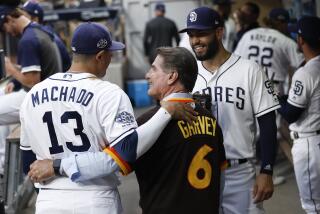BASEBALL / ROSS NEWHAN : Glavine Plays Modest Role of Winner
- Share via
ATLANTA — The line in the box score is much like the pitcher himself:
Neat, efficient and unspectacular.
Or as Tom Glavine said: “With my style, I’m never going to get a lot of recognition or attention. I’m not overpowering; I don’t strike out a lot of people. No one walks away thinking I was awesome.
“But I’ve reached a point where I’m not too concerned if people like me or are impressed by me. I think my manager, coaches and teammates appreciate what I do, and that’s what matters.”
What Glavine did Saturday in Game 3 of the National League playoffs was keep the Philadelphia Phillies close until the Atlanta Braves’ offense exploded for five runs in the sixth inning and four more in the seventh for a 9-4 victory and a 2-1 lead in the best-of-seven series.
It might not have been the thinking man’s left-hander at his changing-speed best, but it was good enough, as Glavine put it, to get the monkey of a winless playoff record off his back.
“You can’t help but think about that when everyone brings it up every year,” said Glavine, now 1-4 in the playoffs after limiting the Phillies to two runs and six hits in seven innings, walking none and striking out five.
Pitching is starting to separate the two teams, and it is difficult to see how the Phillies can stay alive with their pitchers rocked for 23 runs in the last two games and John Smoltz and Steve Avery up next for the Braves in Atlanta, followed by Greg Maddux and Glavine again if needed in Philadelphia.
“Ever since we got Fred McGriff, our attitude as a staff has been that if we can hold the other team to three runs we’ll probably win,” Glavine said. “It takes a lot of pressure off. It makes for a lot of fun.”
It helped produce 104 regular-season victories, and while McGriff receives credit for the comeback from a 10-game deficit, did anyone notice that Glavine was 12-2 in the second half of the season?
Or that he won a career-high 22 games, losing only six? Or that he has won 20 or more games in each of the last three seasons to become the first Brave pitcher to do that since Warren Spahn won 20 or more in six consecutive seasons starting in 1956, and the first National League pitcher to do it since Ferguson Jenkins did it for six seasons in a row starting in 1967?
Glavine will certainly get some Cy Young Award votes, but probably not enough to repeat his 1991 victory. The award will probably go to Maddux, who was 20-10 and led the league in earned-run average and innings pitched.
Glavine won’t complain, but as pitching coach Leo Mazzone said: “I think Tommy uses the recognition thing as a motivation tool.”
No doubt about it, Glavine said.
“I’ve won a lot of big games, but maybe this will get people off my back as far as not winning a playoff game or not winning when it counts,” he said of his Saturday matinee. “Actually, it was just a continuation of what I began in June.”
The 27-year-old southpaw does it with excellent control and an off-speed and breaking-pitch repertoire that makes his modest fastball appear faster. There is also the competitiveness of a former hockey player once drafted by the Kings out of his Massachusetts high school.
Glavine gave up consecutive triples to Mariano Duncan and John Kruk opening the fourth inning of what had been a scoreless game, but restricted the Phillies to one run. He struck out Duncan with two on and two out in the fifth, and retired the last six batters he faced after Kruk homered to open the sixth.
“Psychologically, keeping the damage to one run after the two triples (in the fourth) was a lift for both myself and our hitters,” Glavine said. “The hitters looked at one run as no big deal. Three or four and they might have said, ‘Whoa, we’ve got our work cut out.’ ”
Limit the damage. Throw strikes. Let the defense do its work.
The 1991 acquisition of defensive standouts Terry Pendleton, Otis Nixon, Sid Bream and Rafael Belliard helped to turn Glavine’s career around as much as McGriff helped turn around the Braves this year.
“He struggled early because no one could catch the ball here,” Mazzone said. “The improved defense played a big part in his maturation and improved confidence.”
Now, Mazzone said, Glavine reminds him of Whitey Ford in size, quality of pitches, ability to change speeds and tenacity. Mazzone introduced Glavine to Ford last spring.
“It was a thrill meeting him and it’s a thrill for Leo to think I’m in his class and, by the same token, to be compared to a Warren Spahn. But when I look at their careers, I realize I still have a long way to go,” Glavine said.
“As soon as you get complacent, the league catches up to you. Just because I’d had two 20-game seasons didn’t mean I sat on that. I’ve worked all year on making my breaking stuff better.”
He got the Phillies’ attention with it Saturday. If no one else notices, so be it.
More to Read
Go beyond the scoreboard
Get the latest on L.A.'s teams in the daily Sports Report newsletter.
You may occasionally receive promotional content from the Los Angeles Times.










